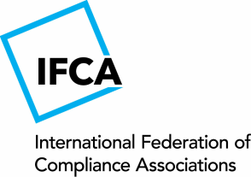Internationally consistent approaches to being a compliance professional or practitioner
Being a compliance professional requires the necessary knowledge, skill, experience and commitment to continued professional development. There are many core competencies and key areas of knowledge that are required, no matter the jurisdiction in which you are operating.
Each of our member associations seeks to support and represent these important professionals and practitioners in the execution of their roles and to promote positive engagement with the compliance function in an organisation and an understanding of the valuable contribution they make within their own organisations and more broadly in society.
As part of doing this, many of our IFCA members provide professional accreditation or certification to individuals who have demonstrated requisite skills, knowledge and experience at a required level. Each association offering these kinds of certifications has established the criteria for the designation to be awarded and may offer them at a variety of levels appropriate for various seniority levels of compliance professional or practitioner.
Accreditation or certification is the process by which a professional association can formally recognise these criteria as dictated by their members as best practice achievements.
Underlying this certification or accreditation process is normally the requirement for qualifications. Qualification refers to a recognised award for the undertaking of coursework and/or assessments and can only be issued, in most jurisdictions, by approved tertiary providers.
The IFCA, as a group, conducts comparisons between the certification programs and requirements of its member organisations and provides the added member benefit of recognition of equivalence if there is sufficient consistency between the various programs. This may only apply to one level of certification provided by any member association.
Currently members of the following IFCA member associations who have successfully obtained the noted accreditations or certifications from one member association, at the specified level, will be recognised by IFCA members as Internationally Certified Compliance Professionals (ICCP):
Please note that the recognition of any accreditation as ICCP can be subject to change without notice. IFCA members work to continually improve their programs and the IFCA group also reviews these requirements on a regular basis.
It is also important to highlight that this recognition process only applies at the accreditation or certification level and not the qualification level.
To find out more about both the qualification requirements and the accreditation process for each association, contact the relevant association directly via our member page.
Each of our member associations seeks to support and represent these important professionals and practitioners in the execution of their roles and to promote positive engagement with the compliance function in an organisation and an understanding of the valuable contribution they make within their own organisations and more broadly in society.
As part of doing this, many of our IFCA members provide professional accreditation or certification to individuals who have demonstrated requisite skills, knowledge and experience at a required level. Each association offering these kinds of certifications has established the criteria for the designation to be awarded and may offer them at a variety of levels appropriate for various seniority levels of compliance professional or practitioner.
Accreditation or certification is the process by which a professional association can formally recognise these criteria as dictated by their members as best practice achievements.
Underlying this certification or accreditation process is normally the requirement for qualifications. Qualification refers to a recognised award for the undertaking of coursework and/or assessments and can only be issued, in most jurisdictions, by approved tertiary providers.
The IFCA, as a group, conducts comparisons between the certification programs and requirements of its member organisations and provides the added member benefit of recognition of equivalence if there is sufficient consistency between the various programs. This may only apply to one level of certification provided by any member association.
Currently members of the following IFCA member associations who have successfully obtained the noted accreditations or certifications from one member association, at the specified level, will be recognised by IFCA members as Internationally Certified Compliance Professionals (ICCP):
- Certificacion de Compliance CESCOM - Asociacion Espanola de Compliance ASCOM (Spain)
- Leadership Professional in Ethics & Compliance (LPEC), ECI (USA)
- Certificación en Ética y Compliance – Asociación Argentina de Ética y Compliance (Argentina)
- Certified Compliance Professional - The Korean Fair Competition Federation (South Korea)
- Compliance Practitioner - Compliance Institute Southern Africa (South Africa)
- Certified Compliance Professional (CCP) and/or Certified Compliance and Risk Professional (CCRP) or higher: Australian Compliance Institute (Australia, New Zealand, Hong Kong & Singapore)
- Licentiate of Compliance Institute (LCI) - Compliance Institute (Ireland)
- Associate of Compliance Institute, Nigeria (ACIN): Compliance Institute, Nigeria (CIN)
Please note that the recognition of any accreditation as ICCP can be subject to change without notice. IFCA members work to continually improve their programs and the IFCA group also reviews these requirements on a regular basis.
It is also important to highlight that this recognition process only applies at the accreditation or certification level and not the qualification level.
To find out more about both the qualification requirements and the accreditation process for each association, contact the relevant association directly via our member page.
